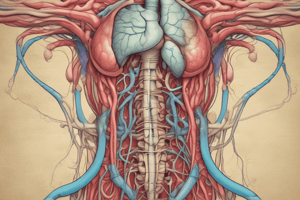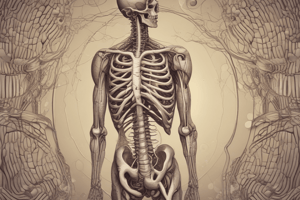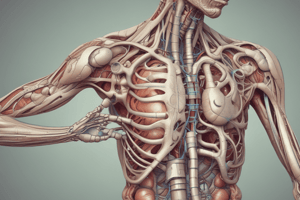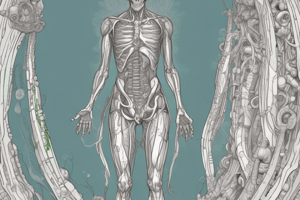Podcast
Questions and Answers
Böbreklerin ekskretuar sistemdeki ana görevi nedir?
Böbreklerin ekskretuar sistemdeki ana görevi nedir?
- Kanınızdaki废物 ve fazla maddeleri süzmektir (correct)
- Kanınızdaki asit-baz dengesini düzenlemektir
- E elektrolit dengesini düzenlemektir
- Kan basıncını düzenlemektir
Üreterlerin yapısal özellikleri nelerdir?
Üreterlerin yapısal özellikleri nelerdir?
- Spiral kas tabakası bulunmaktadır ve üreterler 5-6 cm uzunluğundadır
- Spiral kas tabakası bulunmaktadır ve üreterler 25-30 cm uzunluğundadır (correct)
- Dairesel kas tabakası bulunmaktadır ve üreterler 10-15 cm uzunluğundadır
- Spiral kas tabakası bulunmamaktadır ve üreterler 15-20 cm uzunluğundadır
Böbreklerin kan basıncını düzenlemesini sağlayan mekanizma nedir?
Böbreklerin kan basıncını düzenlemesini sağlayan mekanizma nedir?
- İntramural basınç
- Oto-düzenleme mekanizması (correct)
- Elektrolit dengesi
- Hormon üretimi
İdrar oluşumunda hangi süreçler gerçekleşir?
İdrar oluşumunda hangi süreçler gerçekleşir?
Mesanenin anatomik özellikleri nelerdir?
Mesanenin anatomik özellikleri nelerdir?
Mesanenin detrüsör kası ne işe yarar?
Mesanenin detrüsör kası ne işe yarar?
Flashcards are hidden until you start studying
Study Notes
Excretory System Regulation
- The excretory system is regulated by the kidneys, which filter waste and excess substances from the blood
- The kidneys regulate electrolyte balance, acid-base balance, and blood pressure
- The kidneys also produce hormones that help regulate red blood cell production, blood pressure, and calcium levels
Ureter Anatomy
- The ureters are muscular tubes that connect the kidneys to the bladder
- Each ureter is about 25-30 cm long and 3-4 mm in diameter
- The ureters have a spiral muscle layer that helps propel urine towards the bladder
- The ureters enter the bladder at an angle, preventing urine from flowing back up into the kidneys
Kidney Function
- The kidneys filter approximately 1.5 liters of blood per minute
- The kidneys remove waste and excess substances from the blood, regulating electrolyte and acid-base balance
- The kidneys also produce hormones that help regulate red blood cell production, blood pressure, and calcium levels
- The kidneys have a built-in autoregulatory mechanism to maintain a stable blood pressure
Urine Formation
- Urine formation occurs through the process of filtration, reabsorption, and secretion
- The glomerulus filters the blood, producing a filtrate that enters the renal tubules
- The renal tubules reabsorb water and electrolytes, and secrete waste products
- The collecting ducts concentrate or dilute the urine depending on the body's needs
Bladder Physiology
- The bladder is a muscular sac that stores urine
- The bladder has a layer of transitional epithelium that allows it to stretch and expand
- The bladder has a trigone area that helps prevent reflux of urine into the ureters
- The bladder's detrusor muscle contracts to expel urine during micturition
Görselli Sorular (Visual Questions)
- What is the main function of the kidneys in the excretory system?
- Describe the structure and function of the ureters.
- How do the kidneys regulate electrolyte balance and acid-base balance?
- What is the role of the renal tubules in urine formation?
- How does the bladder store and expel urine?
Studying That Suits You
Use AI to generate personalized quizzes and flashcards to suit your learning preferences.




